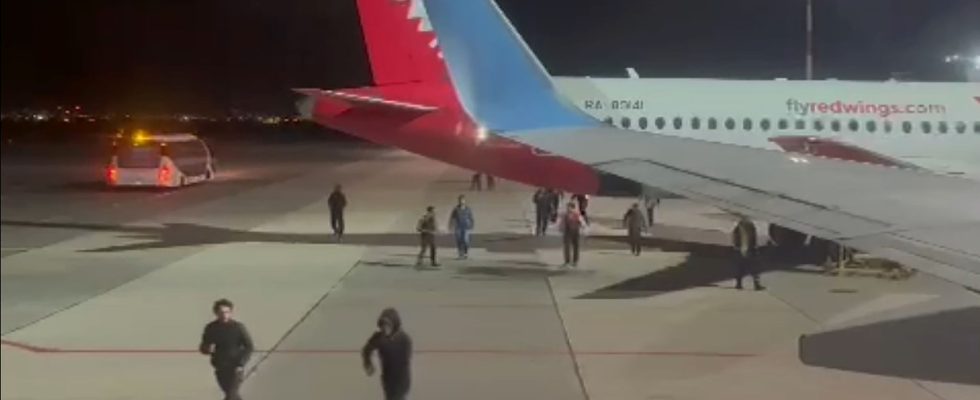Tensions have been rising across the world since Israel’s Gaza retaliation campaign launched after the Hamas terrorist attack on October 7. One region is particularly affected by acts hostile to Israel: the Russian Caucasus. A crowd of men invaded the tarmac and terminal of the airport in Makhachkala, the capital of Dagestan, on Sunday evening, looking for passengers coming from Israel.
Before this attack, on Sunday, the Minister of Information of Chechnya, the neighboring republic, Akhmed Dudayev, had called during the day for calm in the face of rising tensions in the Russian Caucasus, and to avoid “provocations” , while these regions have experienced several anti-Semitic acts.
Earlier today, a Jewish center in the Kabardino-Balkaria region was set on fire in the town of Nalchik, according to RIA Novosti. “Death to Jews” tags were written on the building, reports The world. Similarly, in Khasavyurt, Dagestan, dozens of men besieged a hotel after it was rumored to be hosting “Israeli refugees”.
In the neighboring region of Karachayevo-Cherkessia, also with a Muslim majority, demonstrators demanded “the expulsion of Jews” from the territory, notes The world. The addresses of synagogues and rabbis throughout southern Russia were broadcast by Telegram channels calling for riots, the daily describes. Overview of several Russian republics in the Caucasus where the conflict between Israel and Hamas is having repercussions.
Dagestan
A territory in the Russian Caucasus with less than three million inhabitants, Dagestan has been part of the 21 federated republics that make up Russia since 1991, 22 including Crimea, occupied by Russia following its invasion in 2014. Dagestan is the southernmost part of Russia. This territory has internal borders with Kalmykia (to the north), Chechnya (to the west) and Stavropol Krai (to the northwest), as well as international borders with Georgia (to the southwest) and the Azerbaijan (south).
Dagestan, where Salafist influence has grown significantly in recent years, is the most culturally heterogeneous republic in Russia. No ethnic group forms a majority there. The population is 85% Muslim and predominantly Sunni Shafiite of Sufi tradition. Unlike neighboring Chechnya, Dagestan has never expressed secessionist wishes towards Russia.
Since the second war in neighboring Chechnya (1999-2009), itself triggered by Moscow after the invasion of Dagestan villages by Chechen jihadist rebels, the destabilization of Dagestan has maintained its bad reputation and years of economic stagnation. As Orient XXI reminds us, the establishment of the “Caucasus Emirate” in 2007 by Dokou Oumarov, a Chechen warlord from the Islamist separatist fringe and wishing to establish sharia law throughout the North Caucasus, accentuated the penetration of terrorism, gradually targeting almost exclusively the security forces.
Chechnya
Better known than Dagestan, Chechnya has been the scene of bloody wars. At the end of 1994, after tolerating the de facto independence of Chechnya for three years, Moscow brought in its army to bring this Russian Caucasian republic into line.
Facing fierce resistance, federal troops withdrew in 1996. But in October 1999, under the leadership of Prime Minister Vladimir Putin soon to be elected president, Russian forces entered Chechnya again for an “anti-terrorist operation”, after an attack by Chechen separatists against the republic of Dagestan and several deadly attacks in Russia, attributed to the Chechens by Moscow.
In February 2000, Russia retook the capital Grozny, razed by Russian artillery and aircraft. But the guerrilla war continues. In 2009, the Kremlin decreed the end of its operation, leaving tens of thousands of dead on both sides after these two conflicts. In Chechnya, radical Islamism is promoted by the Kadyrov clan, in power since 2007.
Ingushetia
Bordering Georgia and North Ossetia and covering an area of 3,600 km2, the Republic of Ingushetia was created in 1992 at the breakup of the USSR. Its population, estimated at 500,000 inhabitants, is overwhelmingly Muslim (more than 98%). Ingushetia, where the unemployment rate reportedly stands at 30% of the population, is under increased surveillance from Moscow. In 2018, imams denounced in particular the monitoring of their sermons using surveillance cameras in mosques, intended to avoid the politicization of religious discourse, remember The cross.
The alleged attacker of Arras, Mohammed Mogouchkov, on file for Islamist radicalization, was born in Ingushetia. On October 13, he went to his former establishment, the Gambetta-Carnot school complex in Arras, armed with two knives, fatally stabbing Dominique Bernard, a 57-year-old French teacher, then injuring three other people before being arrested. by a police patrol.
Kabardino-Balkaria, Karachay-Cherkessia…
The Republic of Kabardino-Balkaria, which has a common border with Georgia, is one of the seven other autonomous republics of the Russian Federation, located in the Caucasus region, along with Chechnya, Dagestan, Ingushetia, Karachay-Cherkessia, Adygea and North Ossetia-Alania. The population of this mountainous territory, where Mount Elbrus, the highest peak in Europe (5,643 meters) is located, is predominantly Muslim, like Karachay-Cherkessia.
In the Caucasus, Islam is an “essential” identity referent, explained political science professor Emil Souleimanov in 2012. “For many young Chechens, Dagestanis and Ingush in search of their ethnic and spiritual roots in a context of political and social instability, religion appeared as the only valid idea worthy of being defended” and as “the means of contestation of traditional social structures”, he wrote in an article for the journal Foreign politicreports The cross.
Daesh’s influence remains limited in Russia although attacks occur periodically, particularly in the republics of Chechnya, Ingushetia and Dagestan. In the Caucasus, religious radicals are tolerated as long as they display their loyalty to Moscow and local authorities, the latter going so far as to turn a blind eye to honor killings or the oppression of women, recalls The world.
